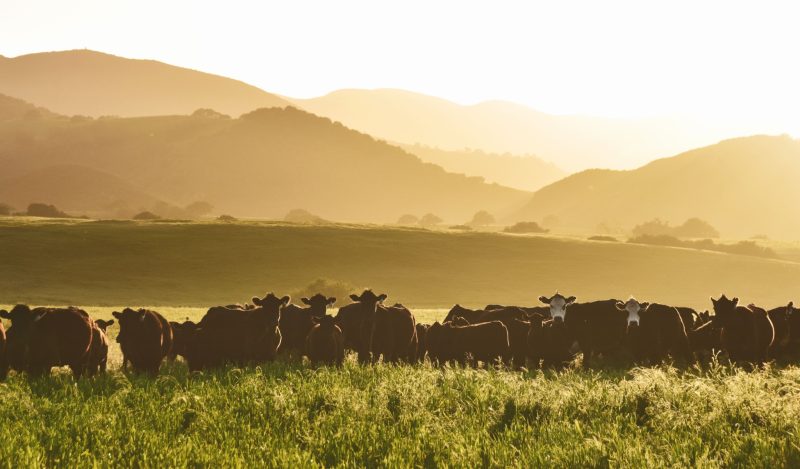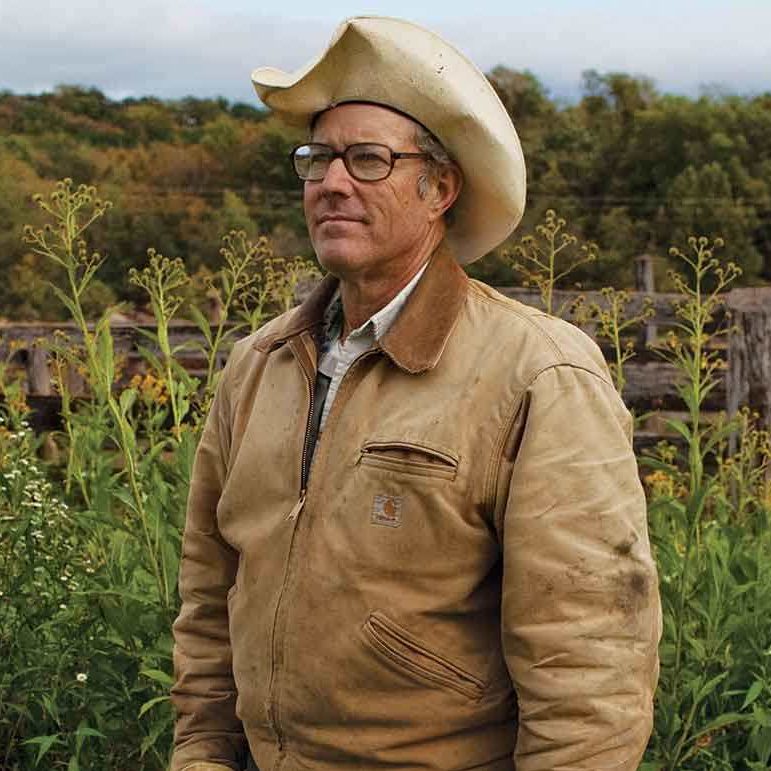Mainline industrial confinement livestock producers routinely feeding subtherapeutic antibiotics to their animals have been desperate for an alternative for many years. As superbugs like cDiff and MRSA developed, consumer backlash against ubiquitous antibiotic use increased.
When consumer advocacy groups pummeled factory farmers with headlines like “Who’s Drugging Your Dinner?” the industry first denied it was a problem, then actively started looking for alternatives. I remember well when Bill Clinton was elected president and hired a French chef who lauded free range chicken.
In an effort to make fun of the new president, conservative talk show host Pat Buchanan sought an alternative chicken producer to ridicule. He found me, offering the Polyface pastured chicken. As a conservative, I assumed Buchanan would be an enjoyable interview; I had no idea I was being ambushed with a hostile agenda.
His first question was “What makes your chicken different?” I quipped “Ours don’t do drugs.” He followed up with “Why does the industry use drugs?” I answered, “Because it makes them grow faster,” and was getting ready to add more information like, “It keeps them alive in fecal particulate air” but he cut me off.
“What could be wrong with making something grow faster?” he chortled and then cut me off. He had his enjoyment at my expense and thought he’d won the day. But if he’d kept me on, I could have explained that growing fast is not necessarily a good goal. Do we want cancer to grow fast? Inflammation is a result of fast growth.
Do we want prisons to grow fast? Fentanyl use to grow fast? I can think of a lot of things I’d like to see grow slower. Girls going through puberty at 8 years old due to injecting hormones in livestock is not benevolent growth.
It was such a shocking simplistic ridiculous exchange that I’ve never forgotten it. Suffice it to say that not everyone thinks “drugging your dinner” is the best way to grow meat. These industrial protocols fueled the anti-animal, vegan movement. As the turmoil increased, as well as the studies showing horrific unintended consequences to routine drug use on farms, the search for alternatives kicked into high gear.
The big question in the industry was whether vaccinations could replace antibiotics. The problem was specificity to disease and long development horizons. Then came the breakthrough: mRNA. About 12 years ago the poultry industry began using mRNA. About 5 years ago the pork industry joined and about 2 years ago cattle followed.
Have you noticed the “antibiotic free” messaging from the industry lately? They don’t say “substitute mRNA for antibiotics.” They just say “antibiotic free.” This is one of the most clever-speaks ever invented.
Of course, just like rBGH in dairy cows—remember that?—used for nearly a decade before going on the label—mRNA has been used for some time without widespread knowledge. Dr. Joe Mercola discovered this in the spring of 2023 and alerted Americans that it was already in our meat. I was unaware of it, like almost everyone else.
Since then, the industry has circled the wagons. When testimony in Missouri’s legislature revealed its use in cattle, the industry quickly put out a press release stating mRNA was “not licensed” for use in cattle. This is a common sleight of words. The industry did not say “We aren’t using it;” notice the words: “not licensed.” The obvious inference to the average consumer is that it’s not being used.
But all sorts of exemptions and loopholes exist around drugs. Both experimental and emergency use make an end run around licensing. This was the case with rBGH in dairy cows. The dairy industry didn’t have to disclose its use, on labels or otherwise, due to its “experimental” designation. If you’re thinking what I’m thinking (Pinky and the Brain) this sounds extremely similar to the clever-speak surrounding mRNA use on humans during Covid—experimental and emergency.
The pork industry is likewise fighting back. And to their credit, they should disparage overreach in the opposition, like charges that “Producers are required to inject livestock with mRNA vaccines.” That is not true, and the industry is justified to point it out.
However, it’s a slippery issue. Just like during Covid, you could argue that the federal government did not require anyone to get the mRNA jab (I refuse to call it a vaccine, because it’s not), many people were forced to get it due to paranoia and tyrannical protocols in the workplace, military, etc. So while farmers aren’t required by the government to use mRNA, I guarantee that if you’re a grower for a vertically integrated industrial outfit, if they require mRNA, you’ll use it to keep your contract.
As reported by Paige Carlson in Farm Journal’s PORK, April 9, 2023, “National Pork Board’s Director of Consumer Public Relations, Jason Menke” noted “that the decision to use vaccines and other medical treatments to protect animal health and well-being are made by the farmer under the direction of the herd veterinarian.” This is equivalent to Dr. Anthony Fauci standing at the podium saying he represents science.
If an industry veterinarian says to use it, then we dare not question.
The same article quotes Dr. Kevin Folta, a molecular biologist and professor at the University of Florida, that mRNA technologies “have been in development for decades.” Oh, I thought they suddenly came into being, like some sort of spontaneous divine intervention, in the fall of 2020. He added that “the technology is being maligned in social media, and is now shaping decisions at the level of state legislature.”
Yes, numerous states are considering legislation to require label disclosure of mRNA use. And of course it’s being questioned on social media, dear professor. Have you heard about adverse reactions? And it enters every cell in the body? And we don’t know what will happen 30 years down the road?
The most egregious cavalier dismissal of unintended consequences I’ve experienced revolved around the grand Poobah announcement within credentialed academic scientific circles in the late 1970s that feeding dead cows to cows was a great idea.
Some farmers, like me, believed in order and not chaos. We couldn’t find a pattern in nature where herbivores eat carrion. We refused to participate in this latest greatest scientific progress and were accused of being Luddites, barbarians, anti-science, anti-progress and a host of other maladies. Lo and behold, 30 years later, bovine spongiform encephalopathy (Mad Cow) reared its ugly head and encompassed the globe in a spasm of unintended consequences.
Did any of these scientists demand to be fired for such an egregious breach of nature’s trust? No. They didn’t even apologize. Sounds like the National Institutes of Health science-throb Dr. Francis Collins and his Centers for Disease Control accomplice Fauci.
What a pair. And what a duplicitous, unthinking world that people still follow these nefarious leaders.
Let’s listen to the imminent land grant professor Folta again: “It’s not in your food. It’s a vaccine for the animal that, just like any vaccine, protects the animal from disease.” The obvious required response is a sweet smile and sigh “Aaahh, isn’t that nice? I’m so glad someone is looking out for the animals.”
Arguably the word vaccine seems more benign than the word antibiotic. Culturally, we tend to think of antibiotic as reactive and vaccine as preventive.
But mRNA is not a vaccine. On our farm, we use no vaccines. In our 60-years-plus commercial farming experience, all livestock diseases are the result of human mismanagement. Yes, we’ve had a few disease outbreaks over many years and countless thousands of animals, but every one has been my fault: lack of sanitation and hygiene, improper diet, uncomfortable habitat. No animal needs mRNA unless it’s subjected to conditions that compromise its immune system.
Folta the expert says the industry is adequately monitoring animals for negative side effects. He’s giddy over applications across a broad spectrum of diseases. These diseases, of course, become problems when production models assault every habitat and physiological desire of the animal. Like chickens being confined for life to a space half the size of a sheet of notebook paper. Like pigs confined in holding cells on slats, so stressful that their tails must be cut off to make the nubs tender enough to move when a cellmate bites it and would otherwise cannibalize. You get the picture.
As prejudiced and beholden to drug agendas as scientists are, if unintended consequences do in fact rear their ugly head in 20 years, will anyone blame mRNA? No, they’ll say we have some sort of unique fairy-dusted pathogen for which surely a new diabolical concoction from the lab can protect.
Where are the scientists admonishing “Let’s honor the pigness of the pig and the chickeness of the chicken, take all their stress off, encourage their immune system and emotional joy, give them some fresh air, sunshine, and exercise, along with some pasture salad, and see how that does to prevent disease?”
No, this is deemed misinformation and hopelessly scientifically backward.
Following the science leads to this, quoting from the PORK article again: “mRNA vaccines are simply another modality that can protect animal health, which results in healthy animals producing the best and safest food products, Folta says, and provides producers with more options to help combat disease.” What could possibly go wrong?
Scientist Folta is incredibly confident: “To have affordable food, we need to have continual innovation in the animal, medical, veterinary space and mRNA vaccines are safe and an effective way to treat the animal that does not change the final product.”
His ilk brought us hydrogenated vegetable oil, DDT, glyphosate, and the 1979 Food Pyramid with Cheerios and Lucky Charms on the foundation.
When you see the industry messaging, it hews pretty close to the mindset and terminology of the entire establishment Covid problem and cure. Is that what we want on our dinner tables? Asked another way, do we really want Fauci in charge of our food?
Join the conversation:

Published under a Creative Commons Attribution 4.0 International License
For reprints, please set the canonical link back to the original Brownstone Institute Article and Author.









